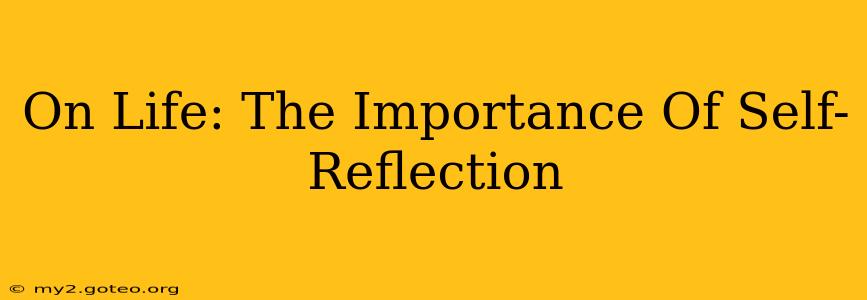Life's a whirlwind. We're constantly bombarded with demands, distractions, and the relentless pressure to keep up. In this frenetic pace, it's easy to lose sight of ourselves – our values, our goals, and our overall well-being. This is where the power of self-reflection comes in. It's not just a trendy wellness practice; it's a vital tool for navigating life's complexities, fostering personal growth, and cultivating a deeper understanding of ourselves and the world around us. This article explores the profound importance of self-reflection and offers practical strategies to incorporate it into your daily life.
What is Self-Reflection?
Self-reflection is the process of deliberately examining your thoughts, feelings, behaviors, and experiences to gain a clearer understanding of yourself. It's about stepping back from the chaos of daily life and taking the time to honestly assess your actions, motivations, and the impact you have on others. It’s a conscious inward journey of introspection, designed to enhance self-awareness and guide personal development. It's not about self-criticism; it's about self-understanding.
Why is Self-Reflection Important?
The benefits of regular self-reflection are numerous and far-reaching. It's a cornerstone of personal growth and contributes to a more fulfilling and meaningful life. Let's delve into some key advantages:
-
Improved Self-Awareness: Through self-reflection, you gain a deeper understanding of your strengths, weaknesses, values, and beliefs. This increased self-awareness allows you to make more informed decisions and navigate challenging situations with greater clarity.
-
Enhanced Emotional Intelligence: Self-reflection helps you identify and understand your emotions, as well as the emotions of others. This boosts your emotional intelligence, improving your relationships and overall well-being.
-
Greater Personal Growth: By regularly examining your experiences, you can identify patterns of behavior, learn from past mistakes, and make conscious choices to improve yourself. This leads to significant personal growth and development.
-
Increased Resilience: Self-reflection enables you to identify your coping mechanisms and build resilience in the face of adversity. You become better equipped to handle stress and overcome challenges.
-
Improved Decision-Making: Understanding your values and beliefs makes it easier to align your decisions with your authentic self, leading to more fulfilling choices.
-
Stronger Relationships: Self-awareness translates to better communication and empathy, which are crucial for building and maintaining healthy relationships.
How Often Should You Practice Self-Reflection?
There's no magic number, but aiming for regular self-reflection, even if it's just for a few minutes each day, is beneficial. Some people find it helpful to reflect at the end of each day, while others prefer to do it weekly or monthly. Consistency is key; find a rhythm that works for you and stick to it.
What are Some Effective Self-Reflection Techniques?
There are several effective techniques you can use to foster self-reflection:
-
Journaling: Writing down your thoughts and feelings is a powerful way to process your experiences and gain clarity.
-
Mindfulness Meditation: Mindfulness practices help you become more aware of your thoughts and feelings in the present moment, paving the way for deeper self-understanding.
-
Guided Self-Reflection Prompts: Using prompts, like "What was my biggest accomplishment this week?" or "What could I have done differently?", can stimulate deeper thinking.
-
Reviewing Past Experiences: Reflecting on significant events in your life, both positive and negative, can provide valuable insights into your patterns of behavior and decision-making.
-
Seeking Feedback from Others: Asking trusted friends or family members for honest feedback can provide a different perspective and highlight areas for improvement.
How Can I Make Self-Reflection a Habit?
Integrating self-reflection into your daily routine requires intention and commitment. Here are some tips:
-
Schedule dedicated time: Block out time in your calendar specifically for self-reflection. Treat it like any other important appointment.
-
Create a conducive environment: Find a quiet and comfortable space where you can relax and focus without distractions.
-
Start small: Don't try to do too much at once. Begin with short reflection sessions and gradually increase the duration as you become more comfortable.
-
Be patient and kind to yourself: Self-reflection is a journey, not a destination. Be patient with yourself and avoid harsh self-criticism. Focus on self-compassion and growth.
-
Find what works for you: Experiment with different techniques to discover what resonates best with you.
What are the Benefits of Self-Reflection for Mental Health?
Self-reflection is a powerful tool for improving mental health. By understanding your thoughts, feelings, and behaviors, you can identify potential triggers for anxiety, depression, or other mental health challenges. This self-awareness allows you to develop healthy coping mechanisms and seek professional support if needed.
How Does Self-Reflection Help in Career Development?
Self-reflection is critical for career development. By regularly assessing your strengths, weaknesses, and career goals, you can make informed decisions about your career path, identify areas for improvement, and create a plan to achieve your professional aspirations.
In conclusion, self-reflection is not a luxury; it's a necessity. By dedicating time to this essential practice, you invest in your personal growth, well-being, and overall quality of life. Embrace the power of introspection, and embark on a journey of self-discovery that will lead you to a more fulfilling and meaningful existence.

